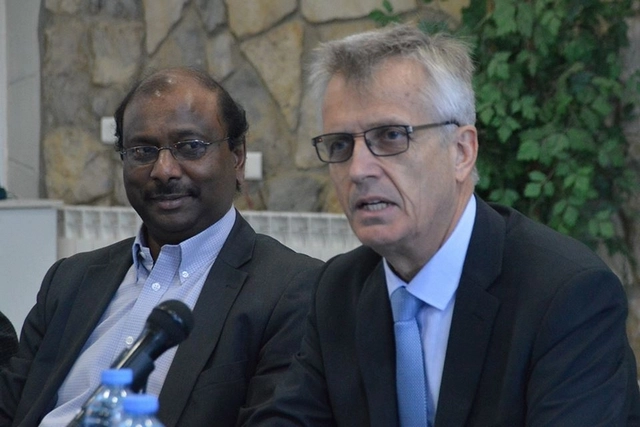- Français
- |
- Booklist
- |
- Week of Prayer
- |
- Links
- Areopagus - a forum for dialogue
- Academic journals
- Acronyms
- Bible tools
- Bibliographies
- Booksellers and publishers
- Churches
- Canadian church headquarters
- Directory of Saskatchewan churches
- Retreat centres
- Saskatchewan church and non-profit agencies
- Ecumenism.net Denominational links
- Anabaptist & Mennonite
- Anglican
- Baptist
- Evangelical
- Independent episcopal
- Lutheran
- Methodist, Wesleyan, and Holiness
- Miscellaneous
- Mormon
- Orthodox (Eastern & Oriental)
- Para-church ministries
- Pentecostal / charismatic
- Presbyterian & Reformed
- Quaker (Society of Friends)
- Roman & Eastern Catholic
- United and uniting
- Documents of Ecumenical Interest
- Ecumenical agencies
- Ecumenical Booklist
- Ecumenical Dialogues
- Glossary
- Human rights
- Inter-religious links
- Justice & peace
- Lectionaries
- Religious news services
- Resource pages
- Search Ecumenism.Net
- |
- Documents
- Ancient & Medieval texts
- Ecumenical Dialogues
- Interreligious
- Anabaptist & Mennonite
- Anglican
- Evangelical
- Lutheran
- Orthodox
- Reformed & Presbyterian
- Roman & Eastern Catholic
- United & Uniting
- Miscellaneous churches
- Canadian Council of Churches (CCC)
- Conference of European Churches (CEC)
- Interchurch Families International Network (IFIN)
- National Council of Churches in Australia (NCCA)
- Lausanne Committee for World Evangelism (LCWE)
- World Council of Churches (WCC)
- Other ecumenical documents
Church traditions
Documents from ecumenical agencies
- |
- Dialogues
- Adventist-Reformed
- African Instituted Churches-Reformed
- Anglican-Lutheran
- Anglican-Orthodox
- Anglican-Reformed
- Anglican-Roman Catholic
- Anglican-United/Uniting
- Baptist-Reformed
- Disciples of Christ-Reformed
- Disciples of Christ-Roman Catholic
- Evangelical-Roman Catholic
- Lutheran-Mennonite
- Lutheran-Mennonite-Roman Catholic
- Lutheran-Reformed
- Lutheran-Roman Catholic
- Mennonite-Reformed
- Mennonite-Roman Catholic
- Methodist-Reformed
- Methodist-Roman Catholic
- Oriental Orthodox-Reformed
- Orthodox-Reformed
- Orthodox-Roman Catholic
- Pentecostal-Reformed
- Prague Consultations
- REC-WARC Consultations
- Roman Catholic-Lutheran-Reformed
- Roman Catholic-Reformed
- Roman Catholic-United Church of Canada
- |
- Quick links
- Canadian Centre for Ecumenism
- Canadian Council of Churches
- Ecumenical Shared Ministries
- Ecumenism in Canada
- Interchurch Families International Network
- International Anglican-Roman Catholic Commission for Unity and Mission
- Kairos: Canadian Ecumenical Justice Initiatives
- North American Academy of Ecumenists
- Prairie Centre for Ecumenism
- Réseau œcuménique justice et paix
- Week of Prayer for Christian Unity
- Women's Interchurch Council of Canada
- World Council of Churches
- |
- Archives
- |
- About us
WCRC deepens relationship with Lutherans
— May 21, 201521 mai 2015The executive committee of the World Communion of Reformed Churches (WCRC) has concluded its meeting in Lebanon.
The executive warmly welcomed Martin Junge, general secretary of the Lutheran World Federation (LWF), to its meeting. “The Reformation, this we have been stressing as we journey towards the [500th] anniversary [in 2017], does not belong exclusively to Lutherans,” he said. “It calls us indeed to reflect how we, Reformed and Lutherans, intend to give expression to our shared sense of ownership of reformation, while expressing at the same time the distinctiveness of our theological and spiritual profiles.”
Building on a successful series of dialogues between the WCRC and LWF, the executive committee is seeking to move from dialogue to implementation as an expression of visible unity and an embodiment of the Lund Principle on the global level between the organizations. The Lund Principle affirms that churches should act together in all matters except those in which deep differences of conviction compel them to act separately.
Two processes will push this goal ahead. One will look toward the 500th anniversary of the Reformation and will include specific proposals at the 2016 executive committee meeting. The second will engage in an analysis of the “Joint Declaration on the Doctrine of Justification,” a theological statement made by both the LWF and the Catholic Church’s Pontifical Council for Promoting Christian Unity, through a series of consultations.
In his address to the executive committee, Jerry Pillay, president of the WCRC, held up both the confessions of Accra and Belhar as documents through which the WCRC can engage in justice and unity. “A living unity, real reconciliation, and caring justice belong integrally together,” Pillay said.
“Our focus on the Accra Confession should help us to remain focused and faithful to our calling in addressing the injustices in the world today,” said Pillay. “It will also help focus us in our desire for unity within the Communion and with others as we continue in the endeavour of Christian unity.”
“Indeed this understanding of justice, peace and reconciliation and unity has deep implications for the WCRC in a variety of ways in how we relate to one another as member churches, how we work towards a true communion as we seek justice, peace and reconciliation and unity among ourselves,” he said.
“We need to put justice at the heart of our communion as we seek to get our ‘hands dirty,’” Pillay said.
In the report of the WCRC general secretary, Chris Ferguson, it was reported that while the current round of Catholic-Reformed dialogue is coming to a conclusion, a new dialogue has begun with Pentecostals and a foundation has been laid to dialogue with Anglicans.
The World Communion of Reformed Churches’ executive committee meets annually to provide oversight to the work of the WCRC, both programmatically and financially. It held its 2015 meeting at the Dhour Choueir Evangelical Conference Center outside of Beirut, Lebanon, under the theme “God of Life, Lead us on your Path of Justice, Peace and Reconciliation.”

 Permanent link: ecumenism.net/?p=8522
Permanent link: ecumenism.net/?p=8522
Categories: News • In this article: Christian unity, dialogue, Lutheran World Federation, World Communion of Reformed Churches

 Lien permanente : ecumenism.net/?p=8522
Lien permanente : ecumenism.net/?p=8522
Catégorie : News • Dans cet article : Christian unity, dialogue, Lutheran World Federation, World Communion of Reformed Churches

